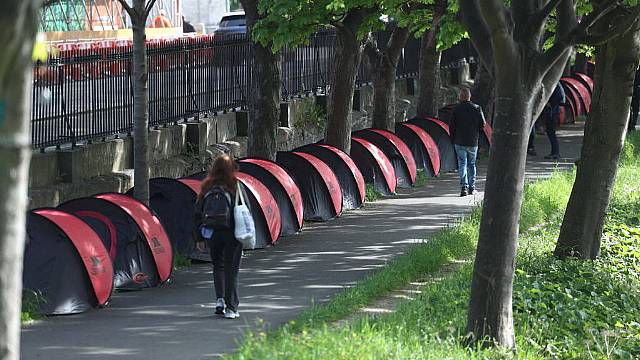Tánaiste Micheál Martin has questioned the wisdom of tents being given to international protection applicants.
“My own view, tents are not a good idea,” he told Newstalk Breakfast. Mr Martin said that many homeless organisations were not in favour of giving out tents because it led to other challenges.
"Tents were also unsafe and there was the fundamental issue of the lack of sanitation and safety “around the pitching of tents in any kind of location within a city or a town."
Minister for Integration Roderic O'Gorman confirmed they are supporting a number of homeless charities to supply tents, washing facilities and food to international protection applicants who cannot be provided with State accommodation.
Hundreds of tents were destroyed when two encampments were removed from Mount Street and the Grand Canal in Dublin.
The short term solution was for the State to find sites where tents with proper sanitation and basic supplies could be provided.
“That is what we have been doing. But we need to create more because the numbers that have come in the first three months at the moment is nearly double what came in the last three months.”
Mr Martin said that the Government would have to consult with NGOs in relation to the giving out of tents.
Get ahead of the issue
Catherine Day, the chair of the advocacy group on direct provision of accommodation, said the State needs to “get ahead” of the issue of providing accommodation for international protection applicants rather than coming from behind.
Recent scenes of people in tents in Dublin underlined the challenge, she told RTÉ radio’s Today with Claire Byrne show.
“I think it underlines the challenge, which is to get ahead, to get out in front of what's happening and not to be always having to respond to, overnight or very immediate consequences.
“And what we have been advocating for some time is that the State needs to get away from the private sector model of desperately trying to find a few beds here and there, and to provide State owned accommodation, probably on State land. And we know that with the unsettled state of the world that desperate people are going to be coming to Europe, including to Ireland, trying just to survive and build a new life, to run away from the situations that they're in, which are life threatening.
So what we have been advocating and, as a group, we're pleased that just before Easter, the Government adopted a new accommodation policy, in which they do accept that now they need to provide accommodation that's State owned, State controlled, and to use State land to do it.”
When asked if the situation of people in tents on Mount Street had been avoidable, Ms Day responded that if the White Paper (from the advocacy group she chaired) adopted in 2021, had been implemented, “we would have been in a better position.
“What we are saying now is that the State has to deal with two challenges at the same time. One is very short, immediate, to take people out of unsafe situations in tents on the street, but also to really crack on with producing longer-term permanent accommodation. Because if we don't do that, we will continue to see a repeat of those problems because desperate new people are arriving all the time.
“One of the recommendations we have been making is that the State should use its powers to waive planning permission and to use quick build, quick accommodation, to put it on State land. These would be buildings through which people will pass. They will not stay there long term. So these are not homes for people. These are centres in which people would stay while their applications are being processed.”
Ms Day acknowledged that there could be concern from the public about the waiving of planning and centres being situated in their area, but her position was that there must be early engagement with communities.
“Almost from the moment when a suitable site is identified, long before people are moved into it. I think it would be natural for people to want to understand what's going to happen in their locality. People are concerned ‘will this put extra pressure on local services, maybe on schools, maybe on health care.’ These are not rocket science issues.
“It's possible to have an open discussion with the local community and to agree solutions if there are going to be extra pressures.”
The Government would have to ensure a fairly even distribution of people across the country, she added, taking into account available sites, numbers of asylum seekers already in each county.
“We haven't seen the detail on that yet, but we think that, that would help and it should be built in then to the local planning and service provision projections for the future so that it is possible for us to have a better solution. And the point we are making is that we have to deal with the emergency, but we also have to now make sure that we get into a situation where we can avoid the emergencies happening.”
“I think it should be feasible to begin to show some results by the end of the year, and that we need to see that because I think the majority of the population understand, that this is, not just, the situation that Ireland is dealing with. All of the developed and prosperous and safe world is dealing with. So we have to make accommodations for it.”







